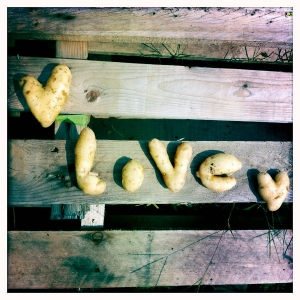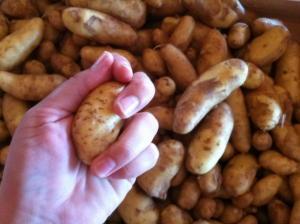The Joys of Potato Farming
 Each year in early August, something special happens here at Blue Moon Acres. Our Pennington, NJ farmers head for the fields and start hunting for buried treasure. Not gold, silver, or jewels, but a more edible kind of treasure: potatoes. It’s a magical experience, pulling those first few tubers from the ground—the sweet, earthy smell; the feel of cool soil on your hands; the anticipation of a favorite soup or stew.
Each year in early August, something special happens here at Blue Moon Acres. Our Pennington, NJ farmers head for the fields and start hunting for buried treasure. Not gold, silver, or jewels, but a more edible kind of treasure: potatoes. It’s a magical experience, pulling those first few tubers from the ground—the sweet, earthy smell; the feel of cool soil on your hands; the anticipation of a favorite soup or stew.
Potato farming is of a breed all its own. Although potatoes can be grown from traditional seed, they are almost always grown from ‘seed potatoes’, tubers specifically raised to be disease-free. (A seed potato is basically a potato with eyelets). These hardened seed-potatoes are planted in trenches and covered with a thin layer of soil. As soon as sprouts appear, another layer of loose soil is applied. This process is repeated again and again until a mound is formed and the plant begins to flower. It is not until the flowering process begins, however, that additional tubers (potatoes) begin to form.
 After flowering has ceased, the vines are cut back and the tubers are left in the ground for one to two weeks. During this time, the potato’s skin hardens, preventing against bruising, and facilitating in storage. To harvest, larger-scale commercial farmers may use a plow or a similar device, but gardeners use a spading fork or potato hook. A properly harvested potato can last many months in cool, dry conditions.
After flowering has ceased, the vines are cut back and the tubers are left in the ground for one to two weeks. During this time, the potato’s skin hardens, preventing against bruising, and facilitating in storage. To harvest, larger-scale commercial farmers may use a plow or a similar device, but gardeners use a spading fork or potato hook. A properly harvested potato can last many months in cool, dry conditions.
Here at Blue Moon, we grow fingerling and butterball potatoes. Fingerlings, resembling short stubby fingers, are perfect for roasting or served with salads. Butterballs are oblong in shape, have a lovely yellow flesh, and are perfect for mashing, frying, and baking. Both varieties are delicious roasted with olive oil, salt, pepper, and garlic.
But no matter how you cook ‘em, potatoes are one of the season’s most interesting and delicious offerings!
